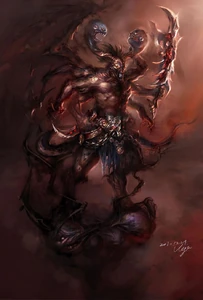Chi You (蚩尤) is a prominent figure in Chinese mythology and ancient history, often regarded as a powerful warlord, tribal leader, or even a demon god. He is famously known for his legendary battle with the Yellow Emperor, Huangdi, during the mythical era of the Three Sovereigns and Five Emperors, which is believed to have occurred around 2600 BCE. Chi You is considered a significant symbol of military prowess, rebellion, and supernatural power in Chinese culture.
Mythological Background[]
Chi You is typically described as having a fearsome, monstrous appearance. Some accounts depict him with a human body but with the head of a bull, horns, and bronze or iron limbs, while others describe him as having 81 brothers, all with similar appearances. Chi You is also said to have had extraordinary strength and was proficient in warfare, using advanced weapons made from bronze.
In many versions of the legend, Chi You is seen as the leader of the Jiuli tribe, a fierce and unruly group that challenged the authority of the Yellow Emperor, who was striving to unify the various tribes of ancient China. Chi You is often associated with chaos and war, earning him the status of a demon god in later mythological interpretations.
The Battle of Zhuolu[]
The most famous myth surrounding Chi You is his epic conflict with the Yellow Emperor, which culminated in the Battle of Zhuolu. According to the legends, Chi You led his Jiuli tribe against the forces of Huangdi, challenging his rule over the Central Plain of China.
The battle was characterized by supernatural elements. It is said that Chi You had mastery over the elements, particularly fog and storms, and used these powers to create thick fog, which disoriented Huangdi's army. He also wielded magical weapons, including swords and spears made from bronze, which were considered advanced technology at the time.
To counter Chi You's magic, Huangdi called upon his own supernatural allies, including deities like Yinglong, the dragon god, and used his own technological advancements, such as the South-pointing chariot (an ancient compass), to navigate through the fog. After a prolonged and intense battle, Huangdi eventually defeated Chi You with the help of these divine forces and his superior strategies.
Chi You's defeat marked the end of his rebellion, and his death is often seen as a pivotal moment in the unification of ancient China under Huangdi's rule.
Legacy and Cultural Significance[]
In Chinese culture, Chi You is often portrayed as both a hero and a villain. In certain southern regions, particularly among the Miao people, Chi You is venerated as a cultural hero and an ancestor. His martial prowess and rebellious spirit are celebrated in festivals and rituals, where he is seen as a symbol of strength and resistance against oppression.
Conversely, in northern China, Chi You is more commonly associated with chaos and destruction. In some Daoist traditions, he is considered a demon or evil god representing war and violence. His image has also been used as a protective figure, especially by soldiers, who see him as a war deity capable of offering protection in battle.
Influence on Modern Culture[]
Chi You's influence extends into modern times, appearing in popular culture, video games, and television. Chi You's dual legacy—as a hero to some and a villain to others—continues to make him a fascinating and complex figure in Chinese mythology and history. His role as an antagonist in the legend of the Yellow Emperor has also become a source of inspiration for contemporary works of fiction, fantasy, and folklore studies.
Literature[]
Notable works featuring Chi You include Shuxia Yehu's The Wilderness Trilogy and Tong Hua's novels The Promise and The Promise of Sorrow.
Video Games[]
Chi You, often depicted as an evil god in ancient texts, frequently appears as the "ultimate demon king" in many Chinese role-playing games. Some notable examples include the Xuan-Yuan Sword series, The Legend of Sword and Fairy series, Fantasy Three Kingdoms series, Sword and Sword Sealing Demon Record Gaiden, Resurrection, Huan Shen Jie, Flower God Fairyland, and Tower of Gods and Demons.
In Nine Days, produced by Chi Cang Games, Chi You is depicted as the younger brother of Xing Tian. In the game, he presents himself as a weak scholar, but both he and his brother were once ancient weapons of Jie State. Born without will, they were designed purely for combat and stored in a warehouse. Over time, exposure to the art and calligraphy in the warehouse led Chi You to develop self-awareness. In the game, he exists as a merchant NPC, offering the protagonist, Yi, various goods. His ultimate goal is to save his brother Xing Tian, who remains without self-awareness. Chi You also expresses a deep appreciation for Xuan Xuan’s artistic talents, purchasing paintings such as Big Brother Immortal Picture and The Legend of the Pig Shooting Hero from Yi.
In the King of Glory game, the assassin race is named after Chi You, feared by countries and other assassin organizations. Each tribe in the game sends two women to participate in a deadly trial, where the last survivor inherits the title of "Chi You."
Anime[]
In the BB Fighter Three Kingdoms War God Duel Edition (2009), Chi You becomes the final demon of the story and evolves into "Chi You Gundam." Additionally, in Shakugan no Shana III (2013), the Red World Demon King "Fengzhi Jinqi" Dihong, who is contracted with the Fire Mist Warrior Yu Xuan, refers to the "General" Xiu Denan of the Red World Apostle Organization "Masquerade" as Chi You.
Chiyou also briefly appears as a minor antagonist in the anime/manga Record of Ragnarok.
Gallery[]
Trivia[]
- Chiyou's more negative depiction bear certain similarities to the popular Western concept of Satan. His rebellion against Huangdi also resembles that of Typhon against Zeus in Greek mythology.









